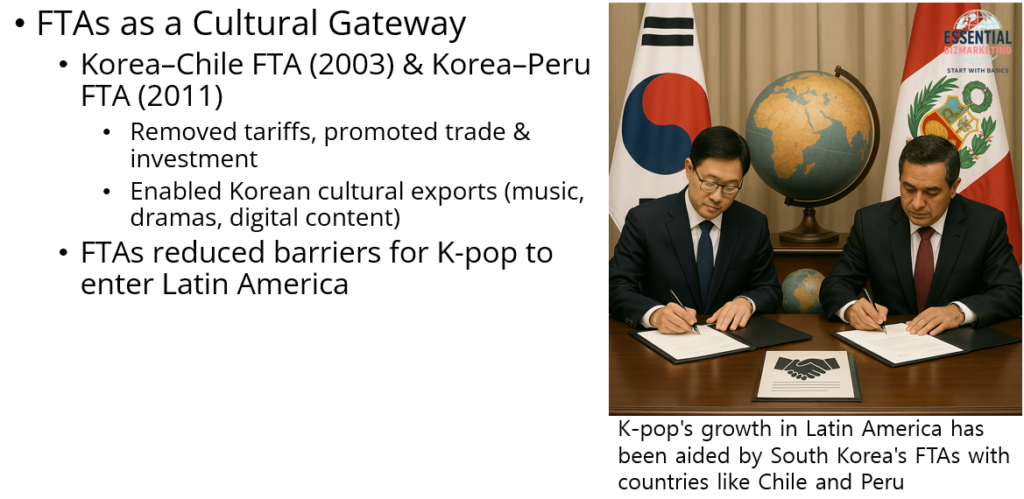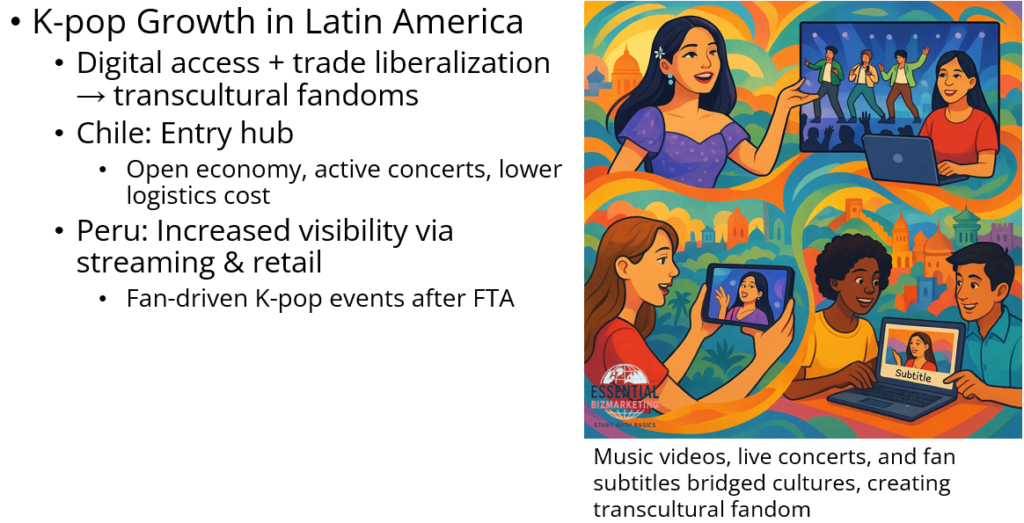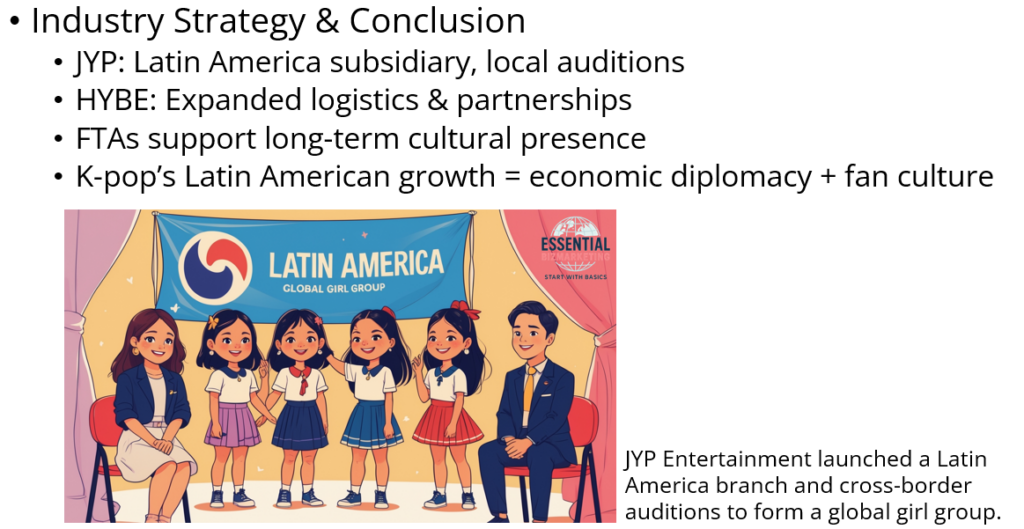Introduction: Trade Agreements as Cultural Gateways

The expansion of K-pop into Latin America has been significantly influenced by the Free Trade Agreements (FTAs) that South Korea has established with countries such as Chile and Peru. These agreements, though primarily focused on trade liberalization, have not only strengthened economic ties but also enabled the cross-border movement of cultural products. In doing so, they have facilitated the spread of Korean popular culture—including music, dramas, and digital content—across Latin America.
Economic Foundations: FTAs with Chile and Peru
In 2003, South Korea signed its first Latin American FTA with Chile, followed by a similar agreement with Peru in 2011. These pacts eliminated tariffs and promoted mutual trade and investment. As economic interdependence grew, so did opportunities for broader exchanges—including those in cultural industries. The agreements laid the structural groundwork for Korean content to enter these markets with fewer regulatory and logistical barriers.
K-pop as a Cultural Export in Latin America

With the easing of trade restrictions, Korean cultural exports found new audiences in Latin America. The growing accessibility of K-pop content, bolstered by digital platforms, quickly built loyal fanbases across the region. Music videos, live-streamed concerts, and fan-subtitled content helped bridge the cultural gap and facilitated what scholars call a transcultural fandom.
Chile as a Launchpad for Korean Entertainment
Chile has emerged as a strategic entry point for Korean pop culture in Latin America. Thanks to its open economy and high receptivity to foreign content, K-pop concerts and fan gatherings have flourished. The Chile-Korea FTA has helped lower the cost of cultural imports and event logistics, which in turn has made Korean artists more accessible to Chilean audiences.
Peru’s Growing Role in Cultural Exchange
Peru has also demonstrated increasing enthusiasm for Korean cultural products. Following the FTA, Korean content gained visibility on streaming platforms and in retail channels, and local fans have organized K-pop events independently. This bottom-up cultural movement, enabled by liberalized trade, shows the non-linear yet impactful reach of economic agreements into cultural domains.
Entertainment Industry Strategy: Going Local in Latin America

Korean entertainment firms have taken notice. JYP Entertainment recently announced the establishment of a Latin America subsidiary and launched a cross-border audition project aimed at creating a global girl group with local talent. Meanwhile, HYBE Corporation has expanded its partnerships and logistics in Latin America, indicating a shift toward permanent market presence rather than short-term engagements. These expansions are made smoother by trade agreements that encourage foreign direct investment and protect intellectual property.
Conclusion: Cultural Influence Built on Economic Frameworks
FTAs between South Korea and Latin American nations like Chile and Peru have gone beyond economics—they’ve become enablers of cultural globalization. By removing trade barriers, these agreements have allowed the Korean Wave to ride more freely across Latin America. Today, K-pop’s growing presence in the region is not merely the result of media algorithms or fandom; it is also the byproduct of strategic economic diplomacy.
📚 References
JYP Entertainment. (2023). JYP to establish Latin America subsidiary, create global girl group. The Korea Herald. https://www.koreaherald.com/article/3437463
López Giral, D., Muñoz Navia, F., & Cáceres Bustamante, J. (2022). The Chile-Republic of Korea Free Trade Agreement: A Synthetic Control Assessment. Economic Commission for Latin America and the Caribbean (CEPAL). https://repositorio.cepal.org/bitstreams/e73524f3-01ab-4760-a97c-cf3cb2727d3e/download
Wikipedia contributors. (2023). HYBE Corporation. In Wikipedia, The Free Encyclopedia. https://en.wikipedia.org/wiki/Hybe_Corporation
Yang, J. (2016). K-Pop in Latin America: Transcultural Fandom and Digital Mediation. International Journal of Communication, 10, 225–243. https://ijoc.org/index.php/ijoc/article/download/6304/2048
Yoon, J. (2023). K-Pop! Assessing the Impact of Korean Wave in Chile. UCLA Center for Korean Studies. https://www.international.ucla.edu/cks/event/17143
📁 Start exploring the Blog
📘 Or learn more About this site
🧵 Or follow along on X (Twitter)
🔎 Looking for sharp perspectives on global trade and markets?
I recommend @GONOGO_Korea as a resource I trust and regularly learn from.
